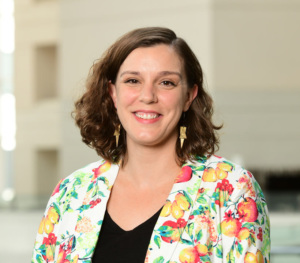To keep our democracy strong, we need to restore trust in news media

By ALEE QUICK
Civic Marketing Manager, News Literacy Project
Americans are politically polarized, cynical about long-respected institutions and disappointed with elected leaders at the local, state and national levels. What’s driving these trends? I believe a sweeping lack of trust is a significant factor.
Trust is an essential element to strong personal, professional and societal relationships. Without it, relationships break down, often with unfortunate consequences. Research bears this out. The 2022 Edelman Trust Barometer found that nearly six in 10 respondents automatically distrust something until they encounter evidence of its credibility. And nearly two thirds said we can no longer have constructive, civil discourse about important issues. The researchers noted, “when distrust is the default — we lack the ability to debate or collaborate.”
The public’s wariness is understandable and misinformation is a major factor. In the 2020 Northwestern University Medill Trust in U.S. News Media study, 82% of those surveyed expressed concern about discerning fact-based information from falsehoods. Three-quarters of respondents in the Edelman study worried about misinformation being used as a weapon.
News organizations and journalists are the focus of much cynicism. Trust in news fell in half the countries surveyed for the 2022 Reuters Institute Digital News Survey, with the U.S. at the bottom with just 26% of respondents trusting the news. And 46% of Edelman respondents found journalists credible, making them the least trusted of societal leaders in the report, barely ahead of government leaders, who gained the confidence of just 43% of respondents.
When trust waivers, so does democracy.
Once trust is gone, it’s tough to regain. But it’s critical that we all work to restore it. That’s because public trust and a news media industry that does its job well go hand in hand in protecting our democracy. That’s why my organization, the News Literacy Project (along with The E.W. Scripps Company), is focusing on trust in newsrooms and news coverage during our fourth annual National News Literacy Week (Jan. 23-27). News literacy is the ability to identify credible new sources so you know what information you can trust, share and act on.
The acceptance of facts is central to productive discourse and the functioning of our institutions. When we can’t agree on a common set of facts and credible sources, that cynicism cascades into distrust of institutions, decision-makers and governing bodies. The result is a weaker democracy.
Then there’s this: Distrust is simply bad for us. A 2021 study at the University of Bonn in Germany found that lack of trust in others is associated with chronic loneliness.
Restoring trust: It’s up to the press and the public.
Trust is a two-way street. To repair this credibility gap between the public and the press, both members of the media and news consumers must act.
News organizations must keep the public well-informed and cover the issues that communities care about most. Newsroom leaders need to clearly identify what is opinion, analysis, or straight news and explain how their newsroom decides what stories to cover and how to cover them.
Improving newsroom diversity is imperative to better reflect the community. While nobody is perfect, being transparent and fixing errors promptly and prominently goes a long way in maintaining credibility.
News consumers are the other half of the equation. We have responsibilities, too. Pay attention to what’s happening in your community. Subscribe to a local news outlet to ensure your town doesn’t become a “news desert.” Hold news organizations accountable. When they make a mistake or coverage falls short, call them on it. Be civically engaged. Learn about the issues important to you and vote.
Most importantly, become more news-literate.
News literacy is key.
What does it mean to be news-literate? This nonpartisan approach to media literacy teaches people how to think about news and other information, not what to think. It provides an understanding and appreciation of the First Amendment and the role of a free press in a democracy, and it emphasizes a healthy skepticism — not cynicism — about the information we encounter.
There are easy ways to learn the skills you need to navigate the news more confidently, protect yourself — and your friends and family — from being misled, and push back against the kind of false and misleading information that eats away at the public’s trust in news. You can learn how to identify credible news sources, spot red flags that often accompany misinformation, and build other news literacy skills at NewsLiteracyWeek.org.
Closing the credibility gap is crucial to the health of our democracy. Trust me on this.
Alee Quick is the civic marketing manager for the News Literacy Project and a former newspaper editor in Illinois. She may be reached at [email protected].